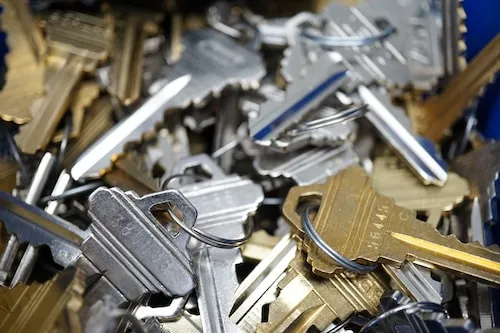Locks are vital in securing our homes and businesses, providing us safety and privacy. However, as time passes, the security of your locks may become compromised due to various factors. One of the best ways to improve the safety of your property is by rekeying your locks. Rekeying involves altering the internal mechanisms of a lock so that a new key can only open it. In this blog post, we will explore the importance of rekeying your locks, when and why you should do it, and the benefits that come with it.
What is Lock Rekeying?
Lock rekeying is the process of changing the internal components of a lock to create a new key that will operate the lock. When a lock is rekeyed, the lock pins inside the cylinder are replaced with new pins that match a different key. This means that the old key will no longer operate the lock, and a new key will need to be used instead.
The rekeying process involves taking the lock apart, removing the old pins, and replacing them with new pins corresponding to a different key. The new key is then used to unlock the lock, which is reassembled.
Rekeying is a cost-effective way to change the keys to your locks without replacing the entire lock itself. It is also quicker than replacing the lock and can be done by a professional locksmith in a relatively short time. Rekeying can be done on almost any type of lock, including residential, commercial, and automotive locks.
The benefits of rekeying your locks
Rekeying your locks offers several benefits, including:
- Improved security: Rekeying your locks can improve the safety of your home or business. By changing the lock’s internal components and creating a new key, you can ensure that only authorized individuals have access to your property.
- Cost-effective: Rekeying your locks is often less expensive than replacing the entire lock. It is also a quicker process so that you can have new keys and improved security in a short amount of time.
- Convenience: If you have multiple locks that use different keys, rekeying them can create a master key system, allowing you to use one key for all your locks. This can make it easier to access your property and reduce the number of keys you need to carry.
- Peace of mind: Knowing that your locks have been rekeyed can give you peace of mind, especially if you have recently moved into a new home or lost your keys.
- Customizable security: Rekeying your locks allows you to customize your security by choosing who has access to your property. For example, you can rekey your locks to prevent previous owners or tenants from accessing your property.
- Increased property value: Rekeying your locks can increase the value of your property by improving its security and giving potential buyers peace of mind.
The Importance of Rekeying Your Locks After Moving into a New Home
Moving into a new home can be exciting, but it is important to remember that your new property may not be as secure as you think. One of the first things you should do after moving into a new home is to have your locks rekeyed. Even if you receive all the keys from the previous owner, other people may have copies of the keys. This could include friends, family, or contractors who worked on the property. By rekeying your locks, you can ensure that only you and trusted individuals can access your home.
If the previous occupants of your new home did not change the locks, there is a chance that someone else has a key to your property. This could increase the risk of a break-in. Rekeying your locks will help prevent unauthorized access to your home and give you peace of mind.
Rekeying your locks allows you to control who has access to your property. By providing new keys only to trusted individuals, you can prevent unauthorized key duplication and reduce the risk of theft or vandalism. Rekeying your locks allows you to upgrade to a high-security lock. High-security locks have additional features, such as reinforced strike plates, pick-resistant cylinders, and drill-resistant bolts, that make them more difficult to pick or bypass.
When should you rekey your locks?
There are several situations in which it is recommended to rekey your locks:
- Moving into a new home: As mentioned earlier, when you move into a new home, it is important to rekey the locks to ensure that only you and trusted individuals have access to your property.
- Lost or stolen keys: If you lose or if they are stolen, rekeying your locks can prevent unauthorized access to your property.
- Divorce or breakups: If you have recently gone through a divorce or breakup, it is recommended to rekey your locks to ensure that your ex-partner does not have access to your property.
- Wear and tear: Over time, locks can become worn and may not function as well as they once did. Rekeying your locks can improve their functionality and ensure that they continue to provide adequate security.
- Upgrading security: If you want to upgrade the security of your property, rekeying your locks can be a cost-effective way to do so. You can rekey your locks to a higher security level or install new ones altogether.
The Process of Rekeying Your Locks: What to Expect from a Locksmith
Rekeying your locks is a process that a professional locksmith can do. The locksmith will assess the locks to determine the type of key pins and springs currently in use. They will also determine the number of keys that can be made from the current lock.
The locksmith will disassemble the lock and remove the cylinder from the lock body. The locksmith will replace the key pins and springs inside the cylinder to match a new key. This process will render any old keys useless. The cylinder is then reassembled and reinserted into the lock body.
The locksmith will test the lock to ensure that it is functioning properly. Finally, the locksmith will provide new keys matched to the rekeyed lock. Rekeying your locks typically takes a locksmith around 10 to 15 minutes per lock, but it can take longer if the locksmith has to install new locks or if the locks are in poor condition.
How to Choose the Right Locksmith to Rekey your Lock
Choosing the right locksmith to rekey your locks is an important decision that can impact the security of your property. Here are some tips on how to choose the right locksmith for your needs:
- Check their credentials: Ensure the locksmith you choose is licensed and insured. You can check with your state licensing board to ensure they are properly licensed.
- Look for reviews: Check online reviews and ask for references from friends and family to get an idea of the locksmith’s reputation.
- Ask for a quote: Get a quote from the locksmith before they start any work to ensure you get a fair price.
- Ask about their experience: Ask the locksmith about their experience with rekeying locks. A locksmith with more experience will be better equipped to handle any issues arising during rekeying.
- Availability: Make sure that the locksmith you choose is available to rekey your locks at a convenient time.
- Transparency: A good locksmith will be transparent with you about their process and pricing. They should be able to explain their work and provide you with a detailed invoice.
- Emergency services: Consider choosing a locksmith who offers emergency services if you need assistance outside normal business hours.
Conclusion
Every house deserves to be safe, and locksmiths can help you achieve that. Several locksmiths out there will rekey locks for a reasonable price. If you’ve decided to move into your new home, you shouldn’t wait until it’s too late to get your locks rekeyed. Every minute counts regarding security, so do what you can to protect your property immediately.
At Old Glory Locksmith, they are here to help you secure your home and protect your belongings. They offer a wide range of locksmith services, including rekeying locks. So if you need help securing your property, please don’t hesitate to contact them today.


